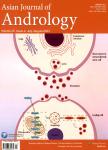Role of C-type natriuretic peptide in the function of normal human sperm
Role of C-type natriuretic peptide in the function of normal human sperm作者机构:Family Planning Research Institute Tongji Medical College Huazhong University of Science and Technology Wuhan 430030 China People's Hospital of Luoshan County Xinyang 464200 China Department of Human Anatomy Tongji Medical College Hua Zhong University of Science and Technology Wuhan 430030 China
出 版 物:《Asian Journal of Andrology》 (亚洲男性学杂志(英文版))
年 卷 期:2016年第18卷第1期
页 面:80-84页
核心收录:
学科分类:0710[理学-生物学] 071010[理学-生物化学与分子生物学] 081704[工学-应用化学] 07[理学] 0905[农学-畜牧学] 08[工学] 0817[工学-化学工程与技术] 09[农学] 090501[农学-动物遗传育种与繁殖]
基 金:supported by a grant from the Doctoral Programs Foundation of the Ministry of Education of China the Independent Innovation Foundation of the Medical College of Hua Zhong University of Science and Technology
主 题:acrosome reaction C-type natriuretic peptide natriuretic peptide receptor-B sperm motility
摘 要:C-type natriuretic peptide (CNP) is a newly discovered type of local regulatory factor that mediates its biological effects through the specific, membrane-bound natriuretic peptide receptor-B (NPR-B). Recent studies have established that CNP is closely related to male reproductive function. The aims of this study were to determine the distribution of CNP/NPR-B in human ejaculated spermatozoa through different methods (such as immunolocalization, real time polymerase chain reaction and Western Blot), and then to evaluate the influence of CNP on sperm function in vitro, such as motility and acrosome reaction. Human semen samples were collected from consenting donors who met the criteria of the World Health Organization for normozoospermia. Our results show that the specific receptor NPR-B of CNP is localized in the acrosomal region of the head and the membrane of the front-end tail of the sperm, and there is no signal of CNP in human sperm. Compared with the control, CNP can induce a significant dose-dependent increase in spermatozoa motility and acrosome reaction. In summary, CNP/NPR-B can affect sperm motility and acrosome reaction, thus regulating the reproductive function of males. CNP may be a new key factor in regulating sperm function.



